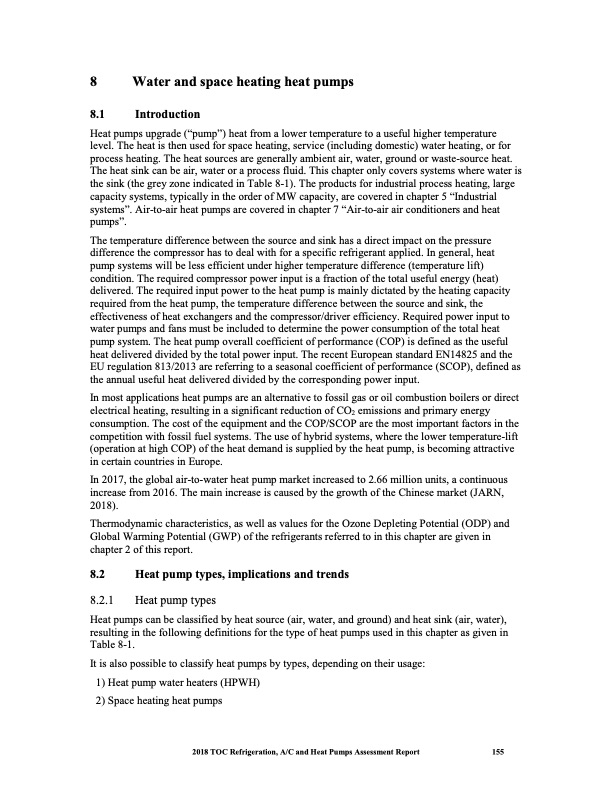
PDF Publication Title:
Text from PDF Page: 168
8 Water and space heating heat pumps 8.1 Introduction Heat pumps upgrade (“pump”) heat from a lower temperature to a useful higher temperature level. The heat is then used for space heating, service (including domestic) water heating, or for process heating. The heat sources are generally ambient air, water, ground or waste-source heat. The heat sink can be air, water or a process fluid. This chapter only covers systems where water is the sink (the grey zone indicated in Table 8-1). The products for industrial process heating, large capacity systems, typically in the order of MW capacity, are covered in chapter 5 “Industrial systems”. Air-to-air heat pumps are covered in chapter 7 “Air-to-air air conditioners and heat pumps”. The temperature difference between the source and sink has a direct impact on the pressure difference the compressor has to deal with for a specific refrigerant applied. In general, heat pump systems will be less efficient under higher temperature difference (temperature lift) condition. The required compressor power input is a fraction of the total useful energy (heat) delivered. The required input power to the heat pump is mainly dictated by the heating capacity required from the heat pump, the temperature difference between the source and sink, the effectiveness of heat exchangers and the compressor/driver efficiency. Required power input to water pumps and fans must be included to determine the power consumption of the total heat pump system. The heat pump overall coefficient of performance (COP) is defined as the useful heat delivered divided by the total power input. The recent European standard EN14825 and the EU regulation 813/2013 are referring to a seasonal coefficient of performance (SCOP), defined as the annual useful heat delivered divided by the corresponding power input. In most applications heat pumps are an alternative to fossil gas or oil combustion boilers or direct electrical heating, resulting in a significant reduction of CO2 emissions and primary energy consumption. The cost of the equipment and the COP/SCOP are the most important factors in the competition with fossil fuel systems. The use of hybrid systems, where the lower temperature-lift (operation at high COP) of the heat demand is supplied by the heat pump, is becoming attractive in certain countries in Europe. In 2017, the global air-to-water heat pump market increased to 2.66 million units, a continuous increase from 2016. The main increase is caused by the growth of the Chinese market (JARN, 2018). Thermodynamic characteristics, as well as values for the Ozone Depleting Potential (ODP) and Global Warming Potential (GWP) of the refrigerants referred to in this chapter are given in chapter 2 of this report. 8.2 Heat pump types, implications and trends 8.2.1 Heat pump types Heat pumps can be classified by heat source (air, water, and ground) and heat sink (air, water), resulting in the following definitions for the type of heat pumps used in this chapter as given in Table 8-1. It is also possible to classify heat pumps by types, depending on their usage: 1) Heat pump water heaters (HPWH) 2) Space heating heat pumps 2018 TOC Refrigeration, A/C and Heat Pumps Assessment Report 155PDF Image | Heat Pumps Technical Options

PDF Search Title:
Heat Pumps Technical OptionsOriginal File Name Searched:
RTOC-assessment-report-2018_0.pdfDIY PDF Search: Google It | Yahoo | Bing
CO2 Organic Rankine Cycle Experimenter Platform The supercritical CO2 phase change system is both a heat pump and organic rankine cycle which can be used for those purposes and as a supercritical extractor for advanced subcritical and supercritical extraction technology. Uses include producing nanoparticles, precious metal CO2 extraction, lithium battery recycling, and other applications... More Info
Heat Pumps CO2 ORC Heat Pump System Platform More Info
| CONTACT TEL: 608-238-6001 Email: greg@infinityturbine.com | RSS | AMP |